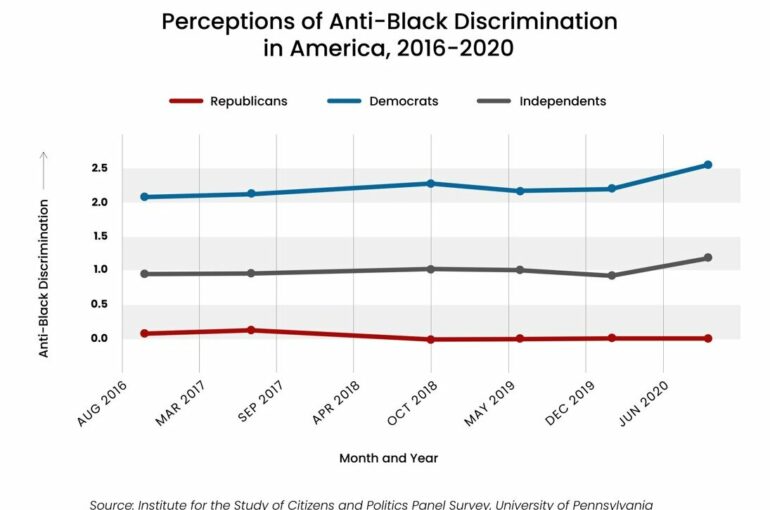It was a turbulent run up to the 2020 U.S. Presidential election: COVID-19 struck, ending and upending lives and livelihoods, while the murders of Ahmaud Arbery, George Floyd and other Black Americans led to Black Lives Matter (BLM) protests nationwide.
There has been much conjecture around the effect these momentous events had on the 2020 election, but a new study from the University of Pennsylvania offers the first evidence that the Black Lives Matter movement encouraged swing voters more toward Biden than toward Trump. During the election, many pundits voiced concerns that the BLM protests would drive swing voters toward Trump, given his campaign’s “law and order” emphasis, and the lack of widespread support for defunding the police. Instead, increased awareness of discrimination against Black Americans encouraged support for the Democratic candidate.
The study also found that concern about COVID-19 and the dramatic drop in GDP that ensued, had little effect on vote choice.
The study used responses from six nationally-representative probability surveys of more than 3000 random Americans each from October 2012 until October 2020, collected by the Institute for the Study of Citizens and Politics (ISCAP) at Penn. The surveys also included panelists who were reinterviewed from survey to survey. By comparing those who changed presidential vote preferences between 2016 and 2020, author Diana C. Mutz, the Samuel A. Stouffer Professor of Political Science and Communication at Penn, was able to analyze the kinds of opinion changes that predicted vote choice over time.
More than 1,200 individuals completed the ISCAP surveys in both October 2016 and October 2020, capturing their opinions and voting intention just before each election. In addition, a survey in February 2020, just before COVID-19 and BLM came to dominate American media coverage, allowed Mutz to see which opinions changed immediately before the 2020 election.
The degree to which people perceived discrimination against Black Americans remained constant through most of Trump’s presidency, but it rose significantly among Democrats and Independents of all races between February and October of 2020, the time when BLM protests took place. Across this entire period, Republicans remained stable in their beliefs that, on average, there is no more anti-Black discrimination than anti-white discrimination.
“Regardless of partisanship, Americans see Democrats as more likely to address racial justice issues than Republicans,” says Mutz, who is also the director of ISCAP. “By changing people’s assessments of the extent of ongoing racial discrimination against Blacks and the need for government to address these issues, BLM opened their eyes to what was going on, and encouraged consideration of racial issues on vote choice.”
Mutz also notes that roughly 90% of voters reliably vote with their party, and only about 10% of voters are likely to shift their vote from one party to another. It was that group that she focused on, finding that as their awareness of discrimination against Black people rose, so too did their likelihood of voting for Biden. Interestingly, many voters who had voted for third parties in 2016 also shifted to major party candidates in 2020, and disproportionately moved toward Biden.
Concern surrounding COVID-19 caused voters on both sides of the aisle to favor their own candidate more, but it did not cause any significant vote change from Trump to Biden or vice versa. Nor, Mutz says, did factors relating to the economic effects of COVID. As levels of concern about COVID became increasingly partisan, the issue lost its ability to change vote choice so much as to reinforce it.
Does that mean BLM decided the election? That question remains unanswered.
While increasing perceptions of racial discrimination against Black people was clearly linked to changing voter preferences in the popular vote, the electoral college makes it difficult to know how key swing states might have been affected. Mutz finds that people in battleground states were no more or less affected by increasing perceptions of discrimination than those in non-battleground states. But without large samples within each of those states, it is impossible to know the effect it had on the Electoral College.
“Effects of changes in perceived discrimination during BLM on the 2020 presidential election” by Diana C. Mutz will be published online in the journal Science Advances on Wednesday, March 2, 2022.
More information:
Diana C. Mutz, Effects of changes in perceived discrimination during BLM on the 2020 presidential election, Science Advances (2022). DOI: 10.1126/sciadv.abj9140. www.science.org/doi/10.1126/sciadv.abj9140
Provided by
University of Pennsylvania
Citation:
The Black Lives Matter movement, but not COVID-19, encouraged voters toward Biden in the 2020 election: study (2022, March 2)



